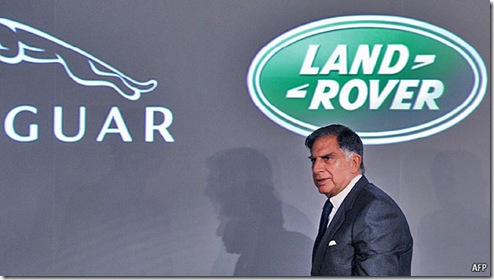IF INDIA were a nation of gamblers, the betting on who will succeed Ratan Tata, chairman of the Tata group, would be furious. Since Tata Sons, the holding company for India’s second-biggest conglomerate, announced last week that it was seeking Mr Tata’s replacement, there has been a whirl of speculation about whom it will appoint.
Published in The Economist.
Would it, in the tradition of so many Indian companies, pick a younger relative? Or would the group confine its search to the tiny, successful Parsi community to which the Tatas belong? Will Mr Tata’s successor even be an Indian? Most unusually in India, the panel appointed to choose his successor has said it will consider foreign candidates.
Mr Tata’s succession is a big issue in India because of the presence the 142-year-old company has in the lives of its fast-growing middle classes, from the salt they sprinkle on their food to the cars they drive and covet. A vast empire, Tata has interests ranging from mineral water to steel. It has also become a symbol of India’s growing might overseas. In its last financial year 65% of the group’s revenues of $70.8 billion came from abroad. During a recent visit to India the British prime minister, David Cameron, remarked that Tata was now Britain’s biggest manufacturer. Its transformation into a global-scale group is largely thanks to two decades of bold leadership from Mr Tata.
When he took over the group from his uncle, J.R.D. Tata, in 1991, it was an unwieldy sprawl of 300 companies. His timing was fortunate, coinciding as it did with Prime Minister Manmohan Singh’s tenure as finance minister and his unshackling of India’s economy. Mr Tata sold a number of unprofitable businesses and kicked the rest into shape. Today, Tata has 98 firms and is one of India’s biggest carmakers and IT outsourcers. These companies are impressive innovators: last year, Tata Motors launched the world’s cheapest car, the $2,500 Nano. Most transformative has been the group’s acquisitive drive overseas, starting with Tetley Tea a decade ago. In 2007 it bought Corus, an Anglo-Dutch steelmaker, for $12 billion, constituting India’s biggest foreign splurge; a year later, it took Jaguar Land Rover (JLR) from Ford Motors for $2.3 billion.
Confounding the critics
Mr Tata’s overseas shopping has drawn some scepticism, especially over the purchase of loss-making JLR. Mr Tata has often confounded his critics, however, and the brand’s sales have overtaken his own estimates. On August 10th Tata Motors posted a forecast-beating first-quarter profit, which it said had been driven by demand for JLR’s luxury models. But the group’s heady expansion will present Mr Tata’s successor with some challenges. Tata has a clear vision: to exploit India’s low costs and the West’s spending power. Holding it all together across diverse industries and countries, however, will take a firm hand.
Whoever takes over from Mr Tata is likely to focus on making work better what the group already has, rather than rushing to acquire more. He will also strive to maintain Tata’s much-lauded “value system”, an important part of its brand in India. Two-thirds of Tata Sons is owned by charitable trusts which finance philanthropic activities. The group is reputed to refuse to pay bribes, and treats its workers comparatively well.
The manner in which it appears to be seeking Mr Tata’s replacement certainly offers a positive example to Indian businesses. Though there is speculation that his half-brother Noel is up for the crown, the group is open to outsiders. That bucks a national trend. Recent research by Bain & Company found that most Indian companies at no point discuss how chief executives will be appointed. “In so many companies the eldest son just becomes the boss,” says Kavil Ramachandran of the Indian School of Business in Hyderabad. “Tata is doing a great job of setting standards here.” And not just nationally: many emerging-market conglomerates, especially in South-East Asia, remain in the grip of ageing founders, and would do well to follow Tata in looking outside for their successors.

